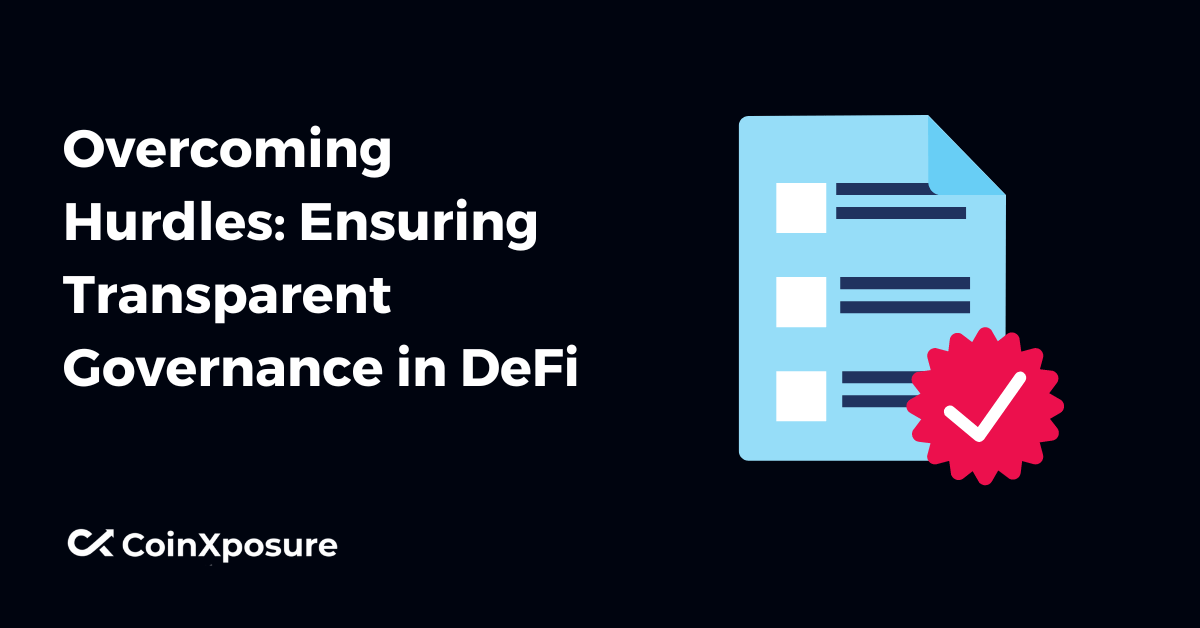Decentralized Finance (DeFi) has emerged as a revolutionary force in the financial landscape, promising borderless and inclusive financial services.
However, the path to realizing the full potential of DeFi is fraught with challenges, and chief among them is the imperative to establish transparent governance frameworks.
As DeFi platforms operate in a decentralized and trustless environment, ensuring transparent decision-making becomes paramount to building credibility and mitigating risks.
This exploration delves into the hurdles hindering transparent governance in DeFi and outlines strategies to overcome them, offering insights into the delicate balance between decentralization, compliance, and community engagement.
In navigating these challenges, the goal is to pave the way for a robust and secure decentralized financial ecosystem that fosters trust and inclusivity.
Understanding the Challenges in Ensuring Transparent Governance in DeFi
The decentralized nature of DeFi, while offering unprecedented opportunities, presents unique challenges that impede the establishment of transparent governance. These challenges can be categorized into several key areas:
- Lack of Regulatory Framework
- Governance Token Dynamics
- Smart Contract Vulnerabilities
Lack of Regulatory Framework
DeFi operates in a regulatory gray area, where the absence of clear guidelines poses challenges for transparent governance.
Striking a balance between the ethos of decentralization and regulatory compliance is a persistent hurdle.
Governance Token Dynamics
Concentration of governance tokens among a few entities can lead to centralization and compromise the democratic decision-making process.
Risks of manipulation and governance attacks due to voting power imbalances require careful consideration.
Smart Contract Vulnerabilities
The reliance on smart contracts exposes DeFi platforms to exploits and vulnerabilities.
The absence of standardized security practices and the potential for coding errors threaten transparent governance.
These challenges collectively create an intricate landscape where achieving transparent governance in DeFi demands strategic solutions that address the technology’s inherent complexities and the need for alignment with regulatory expectations.
The next phase involves exploring strategies to overcome these hurdles and establish a robust framework for transparent governance in the DeFi ecosystem.
Strategies for Transparent Governance in DeFi
A multifaceted approach is required to overcome the challenges hindering transparent governance in DeFi.
Implementing the following strategies can contribute to building a robust and transparent decentralized financial ecosystem:
- Regulatory Compliance
- Tokenomics and Governance Token Design
- Smart Contract Auditing and Upgradability
Regulatory Compliance
Collaboration with Regulatory Bodies: Establish dialogue and collaboration with regulatory authorities to align DeFi practices with evolving regulatory frameworks.
KYC/AML Procedures: Implement Know Your Customer (KYC) and Anti-Money Laundering (AML) procedures without compromising the decentralized ethos, fostering a compliant environment.
Tokenomics and Governance Token Design
Decentralized Token Distribution: Design tokenomics to ensure widespread distribution, preventing concentration of governance tokens in a few hands.
Anti-Manipulation Mechanisms: Implement measures to prevent token manipulation, such as lock-up periods and limitations on voting power.
Smart Contract Auditing and Upgradability
Regular Audits: Conduct security audits of smart contracts by reputable auditing firms to identify and address vulnerabilities.
Secure Upgradability: Implement secure upgradability features, allowing for necessary updates while maintaining the integrity and security of the system.
These strategies aim to strike a delicate balance between maintaining the decentralized nature of DeFi and addressing the challenges posed by regulatory uncertainties and potential vulnerabilities.
By implementing these measures, DeFi platforms can enhance transparency, inclusivity, and security by fostering a more resilient and trustworthy decentralized financial ecosystem.
Future Considerations for Transparent Governance in DeFi:
As the decentralized finance (DeFi) landscape evolves, it is crucial to anticipate and adapt to future challenges and opportunities. Several considerations will play a pivotal role in shaping the future of transparent governance in DeFi:
- Evolving Regulatory Landscape
- Continuous Improvement in Governance Mechanisms
- Technological Advancements
Evolving Regulatory Landscape
Regulatory Clarity: Keep abreast of regulatory developments and work towards establishing clearer guidelines to navigate the regulatory landscape.
Global Collaboration: Encourage collaboration between DeFi projects, regulatory bodies, and policymakers to create a regulatory framework that fosters innovation while ensuring compliance.
Continuous Improvement in Governance Mechanisms
Iterative Governance Models: Embrace adaptive governance models that can evolve based on the community’s needs and changing market conditions.
Innovative Voting Mechanisms: Explore and implement novel voting mechanisms that enhance transparency, inclusivity, and efficiency in decision-making.
Technological Advancements
Enhanced Security Protocols: Invest in and adopt cutting-edge security protocols to mitigate smart contract vulnerabilities and strengthen the security posture of DeFi platforms.
Privacy Solutions: Develop and integrate privacy-focused solutions to address user data and transactional privacy concerns.
By proactively addressing these future considerations, the DeFi industry can navigate challenges, embrace innovations, and pave the way for a more resilient, transparent, and sustainable decentralized financial ecosystem.
Conclusion
The pursuit of transparent governance in Decentralized Finance (DeFi) stands at the intersection of technological innovation, regulatory adaptation, and community engagement.
Despite the challenges posed by regulatory uncertainties, governance token dynamics, smart contract vulnerabilities, and community participation, the strategies outlined provide a roadmap for overcoming these hurdles.
As the DeFi ecosystem continues to mature, it is crucial to recognize the dynamic nature of the regulatory landscape.
Collaborating with regulatory bodies and proactively addressing compliance issues ensures a delicate balance between decentralization and adherence to evolving regulatory expectations.
Tokenomics and governance token design play a pivotal role in shaping the democratic nature of DeFi platforms.
Implementing mechanisms that prevent concentration of voting power and manipulation fosters an environment where decisions are made collectively, reflecting the true spirit of decentralization.
The journey towards transparent governance in DeFi is a dynamic process that requires ongoing collaboration, innovation, and adaptability.
By addressing these challenges and embracing future considerations, the decentralized financial ecosystem can solidify its position as a trusted and inclusive alternative to traditional finance, unlocking new possibilities for global financial inclusion and innovation.












